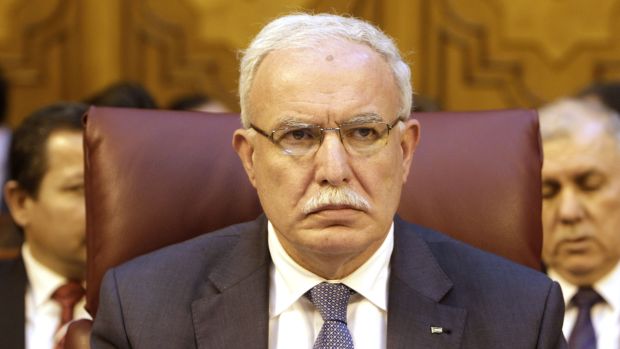
Palestinian Foreign Minister Riyad Al-Maliki attends the Arab League Foreign Ministers emergency meeting at the League’s headquarters in Cairo on December 21, 2013. (REUTERS/ Mohamed Abd El Ghany)
Kuwait City, Asharq Al-Awsat—As the nine-month deadline for a Palestinian–Israeli framework agreement approaches, Palestinian Foreign Minister Riyad Al-Maliki told Asharq Al-Awsat that the agreement aimed at progressing the peace process may be non-binding, significantly weakening the prospects for peace.
In an exclusive interview with Asharq Al-Awsat on the sidelines of the Arab Summit in Kuwait, the Palestinian foreign minister criticized the protracted peace process. His statements come as the Arab Summit is expected to categorically reject the demand for recognition of Israel as a Jewish state, according to a draft statement endorsed by foreign ministers. A number of senior Arab leaders also called for greater support for the Palestinian cause during the first day of the Arab Summit.
The US-formulated framework agreement aims to resolve a number of points of contention that have halted the Palestinian–Israeli peace process for decades. Initial reports about the framework agreement had been positive, with many analysts expecting an agreement to be signed within the nine-month timeframe. However, US Secretary of State John Kerry’s shuttle diplomacy promoting the agreement appears to have fallen down following Israeli Prime Minister Benjamin Netanyahu’s call that the Palestinians must recognize the Jewish identity of the Israeli state, something that Palestinian President Mahmoud Abbas has vowed not to do.
Israel has been pushing for extending the negotiation deadline that is set to expire on April 29, something the Palestinian foreign minister dismissed as “unjustified.” He said: “We are committed, along with the US administration, to the nine-month period which ends on April 29.”
Maliki told Asharq Al-Awsat: “When the nine months end, if there is something that justifies extra time, it will be discussed on the level of the Palestinian leadership and then our Arab brothers will be consulted about the issue before any decision is taken,” adding, “Any amendment to the negotiation formula requires confirmation from the Arab side.”
Palestine’s top diplomat pointed out that any agreement with the Israeli side must also be accompanied by a settlement freeze on the part of Tel Aviv.
“If not linked with halting settlement activity, extending the negotiations will be a cover for the Israeli side to swallow Palestinian territory,” he said.
“We are waiting for the peace agreement according to what Kerry indicated prior to the start of these negotiations. [However,] they lowered their expectations from peace to a framework agreement,” he added.
Asked if Ramallah has any alternatives should the negotiations break down, Maliki said that, after April 29, “We will immediately move to implement these alternatives, including making requests to join international organizations.”
“If there is not something real and tangible that brings us closer to a peace agreement, everything that is being discussed is a framework agreement of no value,” he said.
The Palestinian foreign minister affirmed that the Palestinian side is expecting support from the Kuwait summit. He told Asharq Al-Awsat: “From this summit, we will obtain the support needed and consolidate Palestine’s stance towards the negotiations. This will help us remain steadfast in the face of future pressures.”
As for the Palestinian Authority’s relationship with the Egyptian government, Maliki described Cairo’s decision to designate the Muslim Brotherhood and the Hamas Movement as terrorist organizations as a “miraculous event” marking the end of Brotherhood rule in Egypt.
